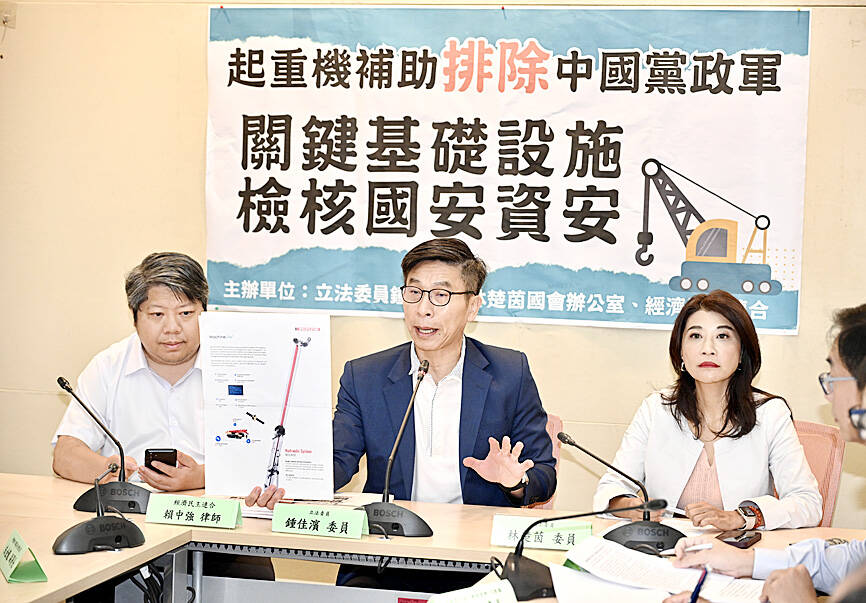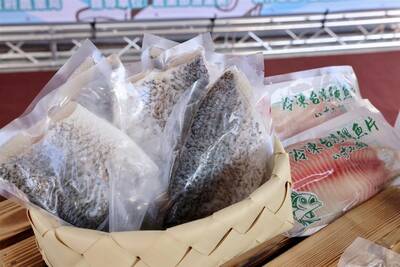The Maritime and Port Bureau yesterday said it would step up inspections of heavy machinery and equipment for construction after lawmakers raised concerns that the use of China-made equipment could pose a security risk.
The government would conduct national security screening against Chinese-made cranes, and ensure that individuals and organizations using such machinery are removed from the eligibility list for subsidies, Democratic Progressive Party (DPP) legislators told a news conference earlier in the day.
The Executive Yuan’s Office of Homeland Security should be checking whether government agencies or critical infrastructure projects are using products, machinery, components and chips from banned areas, DPP Legislator Chung Chia-pin (鍾佳濱) said.

Photo: Lo Pei-de, Taipei Times
Government and critical infrastructure contracts should demand that all contractees provide proof and certification of components’ origins and safety of use, Chung said.
Chinese-made information technology (IT) equipment presents potential security risks and have become a medium through which Beijing collects information, DPP Legislator Michelle Lin (林楚茵) said.
The Ministry of National Defense has banned all Chinese-made products, she said, suggesting that similar bans be implemented across public construction projects and state-owned businesses.
Lin also suggested that the Executive Yuan implement domestic IT security certifications to minimize the risk of outside forces breaking the IT security supply chain.
The government should publicize information about risky companies to better deter enemy forces’ attempts to hack into Taiwanese infrastructure, she added.
Meanwhile, Economic Democracy Union convener Lai Chung-chiang (賴中強) urged the Office of Homeland Security to explicitly ban China-made surveillance equipment and digital billboards, and set a clear timeline for implementing such bans.
Lai also called for the office to establish a certification center to desinicize the IT supply chain industry.
In response, the Executive Yuan’s Public Construction Commission said that labor provision and operation of machinery for construction projects at critical infrastructures or government agencies are controlled via government procurement.
The commission said it would work closely with the Office of Homeland Security to standardize contracts for all projects for government agencies and critical infrastructure.
Of the 431 bridge and gantry cranes in the country, 99 were made in China, the bureau said.
The bureau said it would step up the verification of machinery and software sources for operators. Although there is a reduced IT security risk as operating software is isolated and made by Japan, South Korea or Germany, the bureau has asked the Ministry of Digital Affairs for help and suggestions.
Third parties have been hired to complete audits of machinery used in Keelung and Kaohsiung harbors, the bureau added.

Taiwan's Vice President Hsiao Bi-khim (蕭美琴) said Saturday that she would not be intimidated by the Chinese Communist Party (CCP), following reports that Chinese agents planned to ram her car during a visit to the Czech Republic last year. "I had a great visit to Prague & thank the Czech authorities for their hospitality & ensuring my safety," Hsiao said on social media platform X. "The CCP's unlawful activities will NOT intimidate me from voicing Taiwan's interests in the international community," she wrote. Hsiao visited the Czech Republic on March 18 last year as vice president-elect and met with Czech Senate leadership, including

There have been clear signs of Chinese Communist Party (CCP) attempts to interfere in the nationwide recall vote on July 26 in support of Chinese Nationalist Party (KMT) legislators facing recall, an unnamed government official said, warning about possible further actions. The CCP is actively involved in Taiwanese politics, and interference in the recall vote is to be expected, with multiple Chinese state media and TAO attempts to discredit the Democratic Progressive Party (DPP) and undermine public support of their recall movement, the official said. This interference includes a smear campaign initiated this month by a pro-Beijing Hong Kong news outlet against

A week-long exhibition on modern Tibetan history and the Dalai Lama’s global advocacy opened yesterday in Taipei, featuring quotes and artworks highlighting human rights and China’s ongoing repression of Tibetans, Hong Kongers and Uighurs. The exhibition, the first organized by the Human Rights Network for Tibet and Taiwan (HRNTT), is titled “From the Snowy Ridges to the Ocean of Wisdom.” “It would be impossible for Tibetans inside Tibet to hold an exhibition like this — we can do it. because we live in a free and democratic country,” HRNTT secretary-general Tashi Tsering said. Tashi Tsering, a Taiwan-based Tibetan who has never

A first shipment of five tons of Taiwan tilapia was sent from Tainan to Singapore on Wednesday, following an order valued at NT$600,000 (US$20,500) placed with a company in the city. The products, including frozen whole fish and pre- cooked fish belly, were dispatched from Jiangjun Fishing Harbor, where a new aquatic processing and logistics center is under construction. At the launch, Tainan Mayor Huang Wei-che (黃偉哲) called the move a “breakthrough,” marking Taiwan’s expansion into the Singaporean tilapia market. Taiwan’s tilapia exports have traditionally focused on the United States, Canada, and the Middle East, Huang said, adding that the new foothold in